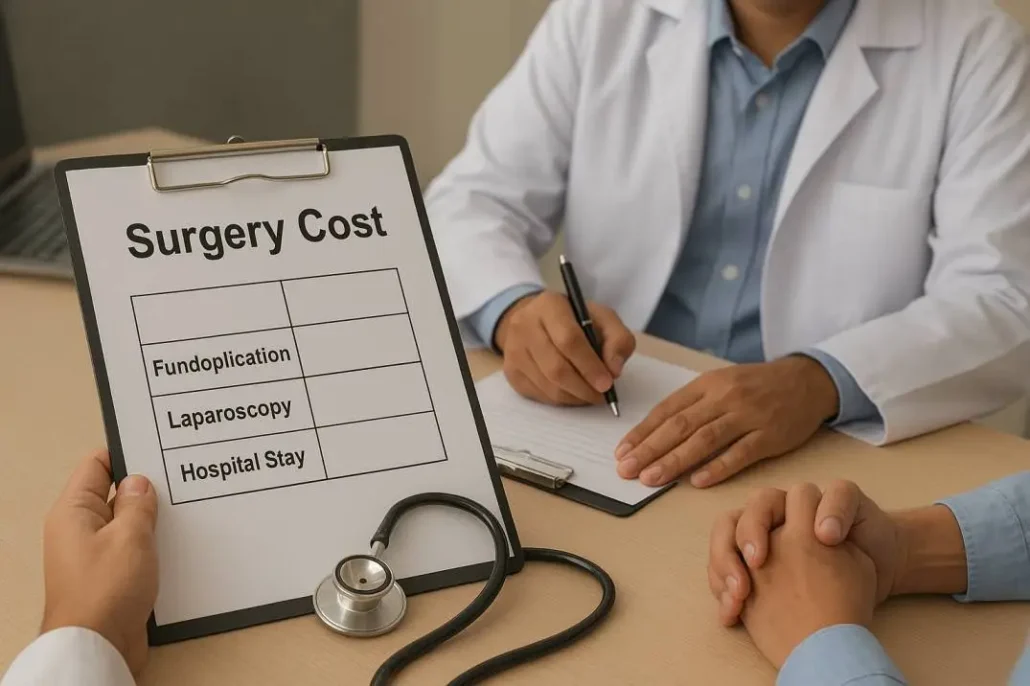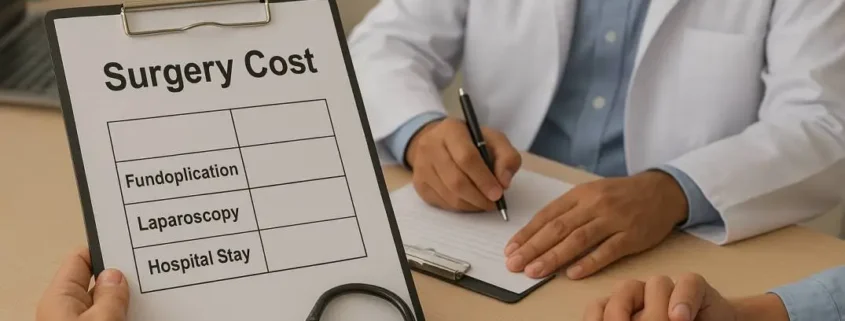Fundoplication Surgery Cost in India
BlogThe average cost of fundoplication surgery in India ranges from ₹20,000 to ₹1,25,000, depending on the hospital, surgeon’s expertise, and your overall health condition.
This cost generally includes surgeon fees, operation theatre charges, hospital stay, and basic medications, but may exclude pre-operative tests and post-surgery follow-ups.
If you’ve been advised to undergo this surgery for acid reflux, GERD, or hiatus hernia, understanding the financial details is the first step in planning your treatment.
In this guide, you’ll find a clear breakdown of the costs, the factors that influence them, and what’s typically included or excluded in hospital packages — helping you make an informed and confident healthcare decision.

What is Fundoplication Surgery?
Fundoplication is a surgical procedure designed to treat gastroesophageal reflux disease (GERD) and hiatus hernias.
During the surgery, the upper part of the stomach, known as the fundus, is wrapped around the lower end of the oesophagus.
This action reinforces the lower oesophageal sphincter (LES), the valve that prevents stomach acid from flowing back into the oesophagus.
The procedure is most commonly performed using a minimally invasive technique called laparoscopy.
Laparoscopic fundoplication involves making several small incisions in the abdomen, which typically leads to less pain, a shorter hospital stay, and a quicker recovery compared to traditional open surgery.
How Much Does Laparoscopic Fundoplication Cost in India?
The cost of laparoscopic fundoplication surgery in India generally ranges from ₹20,000 to ₹1,25,000.
This is an estimated range, and the final cost can vary based on several factors.
This price typically covers the primary aspects of the procedure, but it’s important to confirm what is included with your chosen hospital.
An open fundoplication, which is less common, may have a different cost structure due to a longer hospital stay and recovery period.
What Factors Influence the Final Cost of Surgery?
The price you pay for fundoplication is not a single, fixed number. It is influenced by a combination of medical and non-medical factors. Understanding these variables will help you better navigate your financial planning.
Factor | Description |
City & Hospital Choice | Costs are generally higher in major metropolitan cities (like Mumbai, Delhi, Bengaluru) compared to Tier-2 cities. Renowned private hospitals with advanced facilities also charge more than smaller nursing homes. |
Surgeon’s Expertise | The fees for a highly experienced surgeon with a strong track record in gastrointestinal surgery will be higher. This expertise is a critical factor in the success of the procedure. |
Type of Surgery | Laparoscopic (minimally invasive) surgery is the standard. However, in rare cases where open surgery is required, the cost may change due to the longer hospitalisation needed. |
Patient’s Health | If you have other medical conditions (comorbidities) like diabetes or heart disease, you may require additional monitoring or specialised care, which can increase the overall cost. |
Room Type | The choice between a private room, a semi-private room, or a general ward will significantly impact the cost of your hospital stay. |
Pre-operative Tests | Before surgery, you will need diagnostic tests like an endoscopy, pH monitoring, and blood tests. These are often billed separately from the main surgery package. |
Post-operative Care | The cost of medications, follow-up consultations, and any potential need for extended hospitalisation will add to the total expense. |
What is Usually Included in a Surgery Package?
When a hospital provides a cost estimate for fundoplication surgery, it is often presented as a package. While a la carte billing is also possible, a package helps simplify the costs.
A standard fundoplication surgery package in India typically includes:
- Surgeon’s and anaesthetist’s fees
- Operation theatre charges
- Standard medications and surgical consumables used during the procedure
- Room rent for a specified number of days (e.g., 2-3 days for laparoscopic surgery)
- Nursing care during the hospital stay
What is Often Excluded from the Package?
Be sure to ask about costs that are not part of the standard package. These can include:
- Initial consultation fees
- Pre-surgery diagnostic tests and investigations
- Cost of specialised equipment or implants if needed
- Extended hospital stay beyond the package days
- Post-discharge medications and follow-up consultations
- Treatment for any unforeseen complications
Does Health Insurance Cover Fundoplication Surgery?
Yes, fundoplication surgery is generally covered by health insurance in India. It is considered a medically necessary procedure for treating conditions like severe GERD and hiatus hernia. However, the extent of coverage depends entirely on your specific policy.
Here are some key points to consider:
- Waiting Periods: Most policies have a waiting period for pre-existing diseases. If your GERD is classified as such, you may need to wait a certain period before you can claim the benefit.
- Sub-limits: Some policies impose sub-limits on room rent or specific surgical procedures. Check if your policy has any caps on this type of surgery.
- Network Hospitals: Opting for a hospital within your insurer’s network allows for a cashless transaction, which is much more convenient.
- Pre-authorisation: You must get approval from your insurance provider before the surgery. Your hospital’s insurance desk can help you with this process.
Always contact your insurance provider to understand the exact terms and conditions of your policy before planning the surgery.
Key Takeaways
- Estimated Cost: The average cost for laparoscopic fundoplication surgery in India is between ₹20,000 and ₹1,25,000.
- Key Cost Factors: The city, hospital reputation, surgeon’s experience, and patient’s health condition are the primary drivers of the final cost.
- Package Inclusions: Surgery packages usually cover the operation, surgeon’s fees, and a standard hospital stay. Pre-operative tests and post-operative care are often extra.
- Insurance Coverage: The procedure is typically covered by health insurance, but you must check your policy for waiting periods, sub-limits, and the pre-authorisation process.
- Clarity is Key: Always ask for a detailed cost breakdown from the hospital to avoid unexpected expenses.
Book your consultation for fundoplication surgery today with Doss India, Pune, and regain control of your health!
Frequently Asked Questions (FAQ)
Q1: How long is the hospital stay for fundoplication surgery?
For a laparoscopic fundoplication, the typical hospital stay is 2 to 3 days. If you undergo open surgery, the stay may be longer, around 5 to 7 days.
Q2: What is the recovery time after fundoplication?
Most patients can return to light activities and desk jobs within 1 to 2 weeks after laparoscopic surgery. Full recovery, including the ability to lift heavy objects, may take 4 to 6 weeks. Your fundoplication surgeon will provide specific guidelines based on your progress.
Q3: Are there non-surgical alternatives to fundoplication?
Yes. Before surgery is recommended, doctors usually prescribe lifestyle changes (diet modification, weight loss) and medications like proton pump inhibitors (PPIs). Surgery is typically reserved for cases where these methods fail to provide adequate relief or are not a suitable long-term solution.
Q4: Is fundoplication surgery painful?
You will experience some pain and discomfort after the surgery, particularly around the incision sites. However, this is well-managed with prescribed pain medication. Laparoscopic surgery involves significantly less pain compared to open surgery.
Q5: Can I eat normally after the surgery?
You will be on a special diet that progresses from liquids to soft foods over several weeks. This allows the oesophagus and stomach to heal. Your surgeon or a dietitian will provide a detailed diet plan to follow after you are discharged.


 +919011100010
+919011100010 


